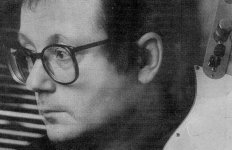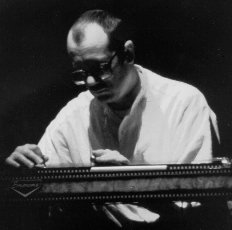David Toop

Interview by Jason Gross (August 1997)
If I had to name a few books on music that were essential reading, one of them would have to be David Toop's OCEAN OF SOUND. Toop's work is an amazing exploration of ambient/immersion music that ranges from Sun Ra to Jon Hassell to Erik Satie to Tibet monks to Herbie Hancock to Aphex Twin and on and on. Not just the breadth of the work but the way that Toop is able to tie together all these threads through stories, interviews, reveries is inspiring. If this had been the only thing he'd done, he would be heralded as a stone-cold genius. The fact of the matter is that he's also written the definitive history of early rap (RAP ATTACK), worked as well-known contributor to The Wire and been an active musician/composer for a long time, putting out eerie, engrossing solo recordings in the '90s. This isn't even mentioning the great collections of music that he's put together: Ocean of Sound and Crooning On Venus are aural companions to the book and Sugar And Poison (one of my favorite CD's ever) is a prime collection of slow soul from the '70s with Guitars From Mars just out.
PSF: What first got you interested in music when you were young (playing or writing or just being a fan)?
I believe that the reasons for becoming fixated on one particular area of experience are generally irretrievable. There must be some conjunction of significant events at a very early age. I explored a few aspects of memory at the beginning of OCEAN OF SOUND, but the source event seems to be beyond my grasp (so far). I know that I was alert to environmental sounds and I remember that the first genre of music that made me want to buy a record was soundtrack themes. That may be because the conjunction of music and image was appealing, or simply because television was new (I was born in 1949), along with all its spin-offs.
I heard a strange selection of music even before I was a teenager, simply because of my aunt and my sister. My aunt Jean went to New York in the Fifties and came back with a stack of 78 rpm records - a mixture of rock 'n' roll, rockabilly, R&B and jazz. My sister Angela was buying the kind of 45's that a lot of teenagers bought in the late Fifties - pop, country, Latin, show tunes, novelty records, rock 'n' roll, easy listening, lite-jazz. The point was that nobody really knew, at that time, exactly what the new pop music was. The kind of infinitely graded genre classification that we know now was unknown then. I consider that to be an influence on OCEAN OF SOUND.
The impetus to play came from rock 'n' roll, with the first inspiration coming from guitar instrumental bands like The Ventures and The Shadows. Again, it was pictorial music, very atmospheric, very movie orientated. I jumped from there to British R&B, tracking down the source artists (Bo Diddley, Chuck Berry, Muddy Waters, etc.), then on to blues, jazz, soul, electronic music, psychedelia, free jazz and so on. But I always stayed a soul fan, never turning into an anti-pop snob!
PSF: Is there some real/imaginary line between music and other sounds (not music) or has the concept of 'ambient' done away with that?
The entire development of 20th century music has done away with the line between 'sound' and 'music' - never mind ambient. But of course, the learning of a perception of music dates back to before Bach, so a general acceptance of this blurring is slow. What amazes me is the speed with which Asian and African cultures have accepted entirely alien musical structures, yet Europeans and Americans are finding the transition to a (potentially) dramatically changed sound world relatively traumatic.
PSF: What are you thoughts on music as medicine- body & soul/spiritual? Abiodun of the Last Poets said that they should prescribe music in hospitals.
Music has the capacity to reconfigure that which is out of joint. It creates pleasure, catalyses emotions, acts as a meditational tool (meditation with a small m, in the sense of inspiring reveries, helping sleep, concentration, generating alpha waves), promotes integration of otherwise alienated human processes, helps us understand ourselves at a level beyond language. I guess the combination of all those effects could be described as spiritual, or medicinal, whatever. Of course, music can have all the opposite effects . . .
PSF: Did you ever wonder about any reconciliation between rap (RAP ATTACK) which is very much a foreground music and ambient, a background music (OCEAN OF SOUND)?
If there is one area where I still feel alienated from many people who seemingly share my views then it's in the question of having to reconcile seemingly incompatible musical styles. For me, it's to do with a breadth of experience. I truly don't understand why the appreciation of one type of music has to cancel out its opposite. Sometimes you want ugly, sometimes you want beautiful, sometimes loud, sometimes quiet. It seems simple and I can't imagine a society, at this point in history, that could function well without that diversity. Not without censorship and repression, anyway. In the end, it's a question of whether a person is making an aesthetic judgement or a covert political judgement. Stockhausen's rejection of repetitive rhythms, for example, seems to be a political judgement, though he describes it as spiritual.
PSF: Charlie Mingus once said that writing about music is like 'dancing about architecture.' Does this ever frustrate you with your work that there aren't always satisfactory ways to convey a piece of music in writing?
There are never satisfactory words to convey a piece of music. That is a perpetual frustration, which is why I have given up journalism.
PSF: What happened?
I fell into journalism almost by accident. The music scene at the beginning of the Eighties seemed to be getting more and more restricted - both artistically and economically - and I felt I wanted to try something else for a while. I pitched an idea for a book about hip-hop, because I loved the music and thought it would make a great story. To my amazement, two publishers were interested so suddenly I was an author. Offers for columns and features came from The Face and other publications. Within a few years, journalism had completely taken over from music.
After about four years, I wanted to get out of journalism and back into music. But journalism is a pernicious form of employment - always running to keep up with deadlines and fashions, never making enough money to break away. After ten years I was sick of it and working for less and less money in order to write what I wanted to write. Then I wrote OCEAN OF SOUND, which was a way of integrating a lot of journalistic material with areas that might be called more speculative, or which broke formal conventions of music writing. Whatever, it felt like there was no way back.
But as soon as I finished OCEAN OF SOUND my whole life shattered anyway. My wife committed suicide, leaving me as a single parent. Events like that change your priorities forever. I wrote a piece about the aftermath of her suicide for Vogue, and that was like a full stop on journalism. The relentless cycle of that kind of writing, and the compromises and triviality that are demanded on a daily basis were not so much a source of frustration, as they had been, but a complete impossibility.
Recording my first solo album - Screen Ceremonies - that summer really gave me the opportunity to pick up musical threads that had been dormant for a long time. Now, what I'm working towards is the integration of written/spoken texts and music. It has taken me a long time to reach this point - there's like a long loop from the point when many of my present ideas - the ideas in OCEAN OF SOUND, the solo albums and the compilations - were hatched in the early Seventies. I was 21-22 then; now I'm 48 and finally I'm getting to the point I always sensed was there but could never quite grasp. My next book - EXOTICA - is conceived as a book that suggests fictional music but can also be read with music. It's intended as the lyrics, or the libretto, of unwritten music and 12 years of journalism have been the training to write such a book.
So nothing is ever a waste of time though following a striaght line is an easier route.
PSF: You included some free jazz on OCEAN OF SOUND. How do you see this as ambient music when it refuses to become a background?
By including free jazz in OCEAN OF SOUND I was making a point about the immersive quality of 20th century musical experiences. Immersion is the key word for me; not background. The whole idea of background music was a red herring, a distraction - there is no such thing as background music, in the sense that so-called background music is always deployed (though not always accepted) as a lifestyle accessory and lifestyle is a collection of strong signifiers.
PSF: Do you find categorizing music is useful/useless or just some innate need we humans have to order/structure things? Is this harmful sometimes?
Categorizing music has a function at the retail level. Beyond that, why? I've never heard a convincing rationale and for a growing number of musicians, catagerozing makes their music harder to sell and harder to find.
PSF: With the music that you record, where do your ideas/inspriation come from?
When I'm preparing to record, I begin to collect visual images, go back to films that connect with the ideas I'm having, gather together texts that add to an atmosphere that I'm looking for. There may be no direct or absolute connection between that atmosphere and the final mixes but the creation of an imaginative space in which the piece, or all the pieces, develop is the best way I know to record music that comes from focused inspiration. The strongest element, though, is the undercurrent of my life. At the time, I have very little idea about how that effects the music but I can see it in retrospect.
PSF: As a music writer, what do you consider as your measuring stick for music? What kind of things hook you or interest you enough to get involved with some music and not other music?
It's almost impossible to say why certain music attracts me, or interests me, and other things leave me cold. The process of criticism is heavily dependent on a rationalisation of subjectivity. As a critic, you can spend your life prioritizing your own tastes with increasingly elaborate intellectual justifications that disallow any alternatives. We can learn a lot from that because the justifications often bring truths with them, but that still doesn't mean one type of music is better than another. I'm very opinionated but I try to stay open; that's my contradiction!
PSF: The structure of OCEAN OF SOUND goes from interviews to reviews to reveries, as you stated. How did you organize the material?
I knew I didn't want to write a conventional, chronological history when I started to write Ocean of Sound, but how to achieve a kind of hypertextual approach in print? The idea of slotting extraneous material into the text - dreams, anecdotes, out-of-context ideas and recollections - came early and turned out to be a liberation. Once the book had established that shape then I found it easy to slip in and out of different modes. For me, it's the way music happens (or history happens) and the challenge is to make overlay and displacement into a coherent, compelling (non) narrative.
